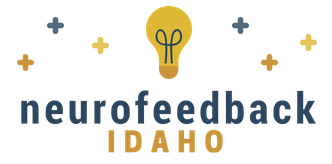Anyone who has gone though a loss or presently finding life challenging, may find IASIS neurofeedback helpful
Most people notice initial changes within three sessions, occasionally a few more. The average number of sessions varies depending on the acuity of one’s condition. Once treatment has been completed, additional sessions are usually not necessary. Occasionally individuals may require a “booster.”
Do not stop or make changes to your medication unless advised to do so by your physician or medical provider.
IASIS Neurofeedback provides a visual or auditory signal corresponding to the status of one or more of a patient’s physiological parameters (e.g., brain alpha wave activity, muscle activity, skin temperature, etc.) so that the patient can control voluntarily these physiological parameters; and a prescription battery powered device that is indicated for relaxation training and muscle reeducation and prescription use.
Traditional Neurofeedback is usually associated with mindfulness training.
Information from your brainwaves is transmitted to a computer screen. Clients attempt to train their brainwaves by mentally manipulating events on the screen. No signal is transmitted back to the brain. This kind of neurofeedback typically requires 40+ sessions, with a typical session lasting 45 minutes to an hour.
With IASIS Neurofeedback clients don’t do anything other than sit still for a few moments. A brief, tiny signal transmitted feeding back to the brain does all the work. IASIS Neurofeedback clients may notice changes either immediately or within the first few sessions. Fast action, limited number of sessions, and the ease and simplicity of treatment all are features of IASIS Neurofeedback.
Yes you can start neurofeedback while on your medications. As you progress your physician might suggest that you slowly reduce or eliminate certain medications related to the condition that you are addressing with neurofeedback. Since every patient is unique, the decision to reduce medication will be up to your physician. More research is needed on this, but a common theory is that the same dosage seems to have a stronger effect on a more efficient brain.
If used improperly, yes neurofeedback can cause problems. That is to be expected from a system that can produce such positive changes. It all comes down to training and proper use. Fortunately, each session is designed to create small changes in brainwave activity, meaning that problems can be spotted and corrected bfore they become bigger. Our clinic has extensive training on this equipment and can change protocols as needed if negative effects are seen.
Recent research suggests that individuals with ADD/ADHD tend to have elevated theta brainwave activity and low levels of beta brainwave activity. Symptoms of ADD/ADHD are usually reduced when brainwave activity is changed. Neurofeedback is commonly used as an adjunct or alternative treatment to medication and behavior management.
Your brain produces four primary types of brain waves: Beta, Alpha, Theta and Delta. Beta is primarily active during your awake state, which is the majority of your day. Alpha has to do with your subconscious, and is dominant during relaxed states when your eyes are closed but you are not asleep. Theta is present briefly during the periods before you fall asleep and before you fully wake up. Delta is primarily active when you are asleep. All of these brain waves are equally important to your health, and neurological disorders can be attributed to specific brain waves. For example, when you have brain irregularities caused by a head injury, your brain may have too much frontal theta or delta being produced when you are supposed to be awake and alert. By retraining these abnormal patterns in the affected areas, symptoms can be improved or eliminated.
Brain mapping is the process we use to visualize inside the brain and identify irregular brainwave patterns. Using a cap placed on your head, our software captures the electrical impulses in the brain. The results are uploaded to a database, which generates a detailed report identifying the problem areas of your brain. The report will also generate a set of protocols for addressing those problems using neurofeedback.
Neurofeedback has been around for decades. To date there are thousands of studies, with more being published every day. This site has a comprehensive list of studies on neurofeedback for many conditions.
Ask us a Question
Feel free to ask any neurofeedback related questions over the phone, or send your questions via this form below. If you're interested in an initial consultation with Dr. Jon Harmon DC, please contact our office to schedule a time that works for you.
